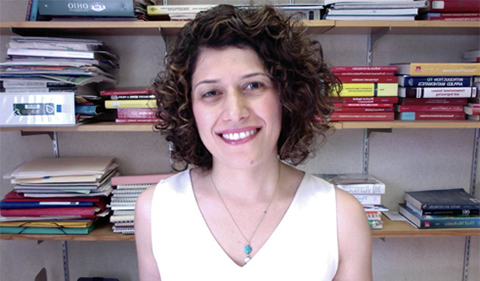
Sarah Hormozi at her office in Stocker Center (Photo: Sarah Hormozi)
By Ling Xin
NQPI Editorial Intern
Nanoscale and Quantum Phenomena Institute 2019 Fall Newsletter
Even as a teenager, Sarah Hormozi was fascinated by the way water flows.
“I was always thinking how we can express fluids in the language of mathematics,” she said.
Driven by her curiosity in math and physics as well as her family business background, she chose to study mechanical engineering in college. Now, as an associate professor at Ohio University’s Russ College of Engineering and Technology, her expertise lies in soft matter physics, a discipline which aims at understanding the mechanics of complex fluids—fluids we deal with in daily life, from shampoo to food being cooked in the kitchen, as well as natural disasters such as landslides and avalanches.
As these materials behave in a complex fashion, Hormozi strives to find the connection between their complex behaviors and the underlying molecular structures. Such studies are crucial for material engineering, which requires understanding molecule-scale structures and integrating different length scales. For instance, one of her projects is focused on developing a material that can better resist vibration and shock.
Her research is a combination of theories, experiments and computational simulations. “These tools are complementary,” she said, which allows her to approach a scientific question from different perspectives at different stages of research.
Hormozi joined OHIO in 2014 and she has enjoyed the collegial environment and welcoming colleagues since then. As a new member of the Nanoscale Quantum Phenomena Institute (NQPI), she is very attracted to the Institute because of its interdisciplinary nature. She is looking forward to establishing close collaborations with colleagues from physics and chemistry departments in particular.
She also encourages young female scientists to follow their passion in STEM fields. “I’ve always followed what I liked in life,” she said, “and please remember to hold on to your dreams.”



















Comments